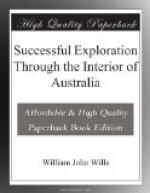From Camp 2.
Thursday, 25th April, 1861.—Awoke at five o’clock after a most refreshing night’s rest—the sky was beautifully clear, and the air rather chilly—the terrestrial radiation seems to have been considerable, and a slight dew had fallen. We had scarcely finished breakfast, when our friends the blacks, from whom we obtained the fish, made their appearance with a few more, and seemed inclined to go with us and keep up the supply. We gave them some sugar, with which they were greatly pleased—they are by far the most well-behaved blacks we have seen on Cooper’s Creek. We did not get away from the camp until 9.30 A.M., continuing our course down the most southern branch of the creek which keeps a general south-west course. We passed across the stony point which abuts on one of the largest waterholes in the creek, and camped at 12.30 about a mile below the most dangerous part of the rocky path. At this latter place we had an accident that might have resulted badly for us: one of the camels fell while crossing the worst part, but we fortunately got him out with only a few cuts and bruises. To Camp 3.—The waterhole at this camp is a very fine one, being several miles long, and on an average about—chains broad. The water-fowl are numerous, but rather shy, not nearly so much so, however, as those on the creeks between here and Carpentaria; and I am convinced that the shyness of the latter, which was also remarked by Sturt on his trip to Eyre’s Creek, arises entirely from the scarcity of animals, both human and otherwise, and not from any peculiar mode of catching them that the blacks may have.
From Camp 3.
Friday, 26th April, 1861.—Last night was beautifully calm and comparatively warm, although the sky was very clear. We loaded the camels by moonlight this morning, and started at a quarter to six: striking off to the south of the creek, we soon got on a native path which leaves the creek just below the stony ground and takes a course nearly west across a piece of open country, bounded on the south by sand ridges and on the north by the scrub by ground which flanks the bank of the creek at this part of its course. Leaving the path on our right at a distance of three miles, we turned up a small creek, which passes down between some sandhills, and finding a nice patch of feed for the camels at a waterhole, we halted at 7. 15 for breakfast. We started again at 9.50 A.M., continuing our westerly course along the path: we crossed to the south of the watercourse above the water, and proceeded over the most splendid salt-bush country that one could wish to see, bounded on the left by sandhills, whilst to the right the peculiar-looking flat-topped sandstone ranges form an extensive amphitheatre, through the far side of the arena of which may be traced the dark line of creek timber. At twelve o’clock we camped in the bed of the creek at camp—, our last camp on the road down from the Gulf, having taken four days to do what we then did in one. This comparative rest and the change in diet have also worked wonders, however; the leg-tied feeling is now entirely gone, and I believe that in less than a week we shall be fit to undergo any fatigue whatever. The camels are improving, and seem capable of doing all that we are likely to require of them.—To Camp 4.




